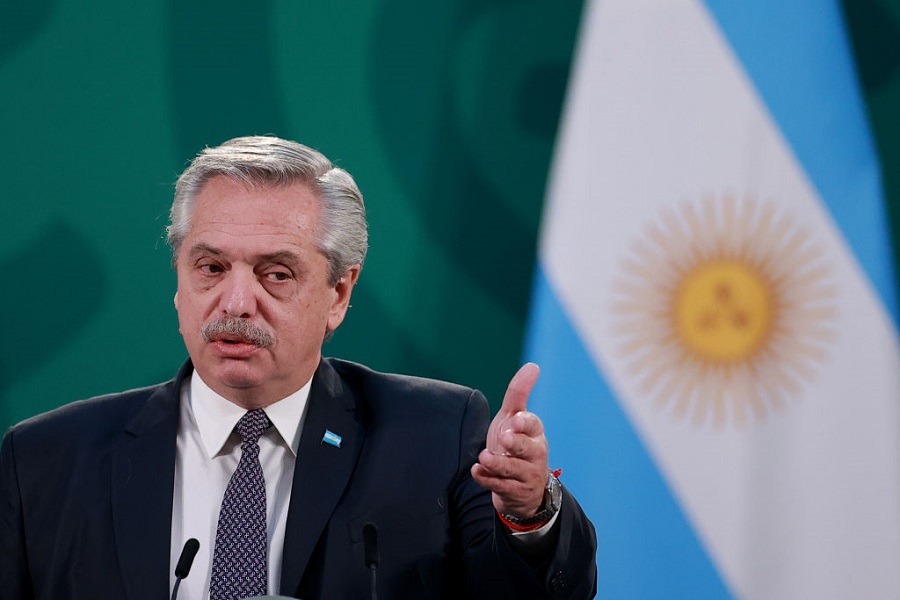RIO DE JANEIRO, BRAZIL – (Infobae) The Government of Alberto Fernández is currently evaluating whether to strike a blow with uncertain consequences, writes Argentine newspaper Infobae. The aim is to rescind all bilateral agreements signed in the last 30 years involving diplomatic relations between Argentina and the United Kingdom, a link broken after the Falklands/Malvinas war in 1982 but re-established eight years later.
The Fernández/Kirchner administration – upon the advice of the Ministry of Foreign Affairs – could be trying to gain some sympathy at home, especially among the elusive electorate that includes the military, a related nucleus of former combatants and nationalist sectors, which is extremely sensitive about sovereignty over the islands.

Diplomatic sources confirmed to Infobae that the Government’s analysis would be to use the anniversary of the date of the Falklands invasion – April 2nd, 1982 – to make the announcement. This would be a complete reversal of the Madrid I and II agreements (February 1990) by which diplomatic relations between both countries were resumed.
Thanks to those agreements, a continuous channel for consultation was established between Buenos Aires and London to normalize ties and the South Atlantic situation. In addition to political and military matters, the pact also covered fishing and other economic sectors to avoid future disputes and conflicts.
Moreover, the bilateral memorandum of understanding signed on September 13th, 2016, known as Foradori-Duncan (after the names of the diplomats who signed it for Argentina and the UK, respectively) is also in the sights of Fernández and his closest advisors.
The fact that this letter of intent was issued during Mauricio Macri’s administration will allow the Argentine government to give an ideological slant to the decision.
However, people close to the Casa Rosada, are hopeful: “To repeal those agreements would vindicate him (the President) with the Argentines and, above all, the Malvinas Cause. It is an administrative act that has a great political repercussion for the world, for the Argentine military, active and retired, for the veterans. Besides, all the nationalists would support it.”
In government offices, some believe that fighting with the United Kingdom is a good idea at this time. Supporters of this strategy would add snubs to the United States, Chile, Brazil, and Uruguay, as well as Argentina’s increasing proximity to Caracas. The most recent snub was the slamming of the door to the Lima Group of countries that oppose Maduro’s regime.

According to official calculations, the move could strengthen the identification with the hardline wing of the governing party alliance, to which new sectors of the electorate could be added, at a time when a deep political crisis, lack of response to the pandemic, institutional weakening, and an alarming decline of the economy are evident.
Nationalist déjà vu
Among the arguments put forward by the detractors of the 2016 pact are: (1) the document signed by the then government of President Macri was not submitted to the National Congress; and (2) the points of agreement only favor the British position and should therefore be repealed.
Two of the voices most opposed to this agreement are former senator for Río Negro Magdalena Odarda – currently president of the National Institute of Indigenous Affairs – who presented a bill to repeal it in 2019, and the current Secretary for the Malvinas, Antarctica, and South Atlantic, Daniel Filmus.
In September of 2019, Filmus wrote an opinion column announcing the basis of his work in the Foreign Ministry: “We are convinced that the Malvinas Question will again be a State policy in the next government. With that conviction, Argentine men and women will continue to claim our sovereign rights over the Malvinas, Georgias, the South Sandwich Islands, and the surrounding maritime areas through diplomatic and peaceful means. The 21st century does not allow situations as anachronistic and unjust as colonialism to continue to remain in force.”
The former Minister of Education reproached the outgoing Macri government for having submitted to the demands of then UK Prime Minister Theresa May.
Andrés Cisneros, one of Argentina’s most experienced diplomats, recalled to Infobae how the agreements reached with the United Kingdom were designed during the first months of President Carlos Menem’s administration in 1990. At that time, Cisneros was Guido Di Tella’s vice-chancellor. He also explained that progress was achieved in several areas thanks to those treaties, which were later dynamited by the administrations of Néstor Kirchner and even Mauricio Macri.
Cisneros remarked that although in the oil sector there were no advances- due to the high production costs – there were achievements in natural fishing resources. “In fishing, we did better, and for some years, we shared the resource quite equitably. Then came Kirchnerism, the agreement ceased to be applied, and now the British are taking everything. The air connection was progress, then was torpedoed by the Kirchnerist administrations and badly finished off during Macri’s term.”

For the career ambassador Roberto García Moritán, if this maneuver is confirmed, it would show the “improvisation and lack of experience” in the current Foreign Ministry. “I prefer serenity on such sensitive questions as Malvinas. Such a complex relationship requires a moment of greater tranquility, rather than stirring up waters; demolishing is easier than building.” he expressed in a dialogue with Infobae.
García Moritán believes that rescission of those agreements, especially those of Madrid, would not be opportune. “Madrid I established the resumption of diplomatic and consular relations. Are diplomatic relations suspended?” he asked. Moreover, he expressed concern about the possibility that domestic issues would taint decision-making on international policy issues. “It would be a shame to mix local issues with such important issues,” he warned.
“If now they end up cutting everything, the ones who are going to celebrate are the British: their future entries to the continent will no longer have to be through Argentina, but they will be able to fly and trade even more with any of our neighbors,” Cisneros said. For the former strong man of the San Martin Palace, “this cancellation measure fits like a glove with the rest of an isolationist, jingoistic and demagogic foreign policy. The whole world was expecting it.”
For the UK, the current administration’s potential measure is seen as a déjá vu of the tragic decision taken by former dictator Leopoldo Fortunato Galtieri, who ordered the invasion of the islands 39 years ago. Experienced British diplomat Dudley Ankerson, who was a member of the UK Diplomatic Service from 1976 to 2006, told Infobae, “If the Argentine government abrogates these agreements, it will represent a serious step backward for relations between the two countries and for the chances of an eventual agreement.”
“I suppose that President Fernández, under the influence of CFK (Cristina Fernandez de Kirchner), is going to try to use the Falklands issue to distract the public’s attention from the problems of his government, just as Galtieri and the Junta did in 1982,″ remarked the ambassador while enjoying his vacation. For Ankerson, “the best hope for Argentina to achieve sovereignty over the islands in the long term would be to earn the goodwill of the islanders. This has always been the case. However, the Casa Rosada’s strategy at present would be based on more hostile acts towards its inhabitants.”

The Madrid agreements
“Since time immemorial, every country that loses a war begins the recovery trying to reinstate the situation before it. (Raúl) Alfonsín had not put an end to the state of war, and we began by declaring it, by returning to maintain diplomatic relations with the United Kingdom,” said Cisneros when making an analysis of foreign strategy at that time.
Cisneros recalled that back then, just as now, many protagonists of Argentine political life “were still beating the drums of patriotism and demagogy that never led to anything but deceiving the people.”
“Our vision was that we would reach a definitive settlement with the British, satisfactory for both parties, more quickly, if, instead of insulting each other we started cooperative tasks that would show the world a different attitude from Galtieri and would allow paving the way to that definitive solution,” he underlined.
“The agreements that are now being threatened with cancelation were an attempt in that direction. Were they perfect? No. Could more have been achieved? Maybe, but not much is achieved after a war that we ourselves started and, on top of that, we lost,” Cisneros added.
Today, these advances are about to be dynamited by new circumstantial speculation. The Foreign Ministry headed by Felipe Solá seeks to showcase an “achievement” in the international arena with a maneuver that would deteriorate relations with the United Kingdom.
To rescind the Madrid agreements would leave the country on the verge of a diplomatic rupture with London. Repealing a press release is no more than theater of the absurd. Alberto Fernández’s government’s diplomatic heterodoxy could lead to a final push towards the isolation to which Argentina is seemingly headed.
Argentine Foreign Ministry denies report
Argentina’s Foreign Ministry Wednesday denied the allegations published by daily Infobae, according to which the administration of President Alberto Fernández was eyeing the termination of the bilateral agreements with the United Kingdom regarding the issue of the Falkland Islands.
“The Foreign Ministry informs that the versions of a note from Infobae on alleged new Argentine plans in relation to the United Kingdom and the Malvinas question are absolutely false. The Government continues with the state policy of great consensus validated by Congress.”
Source: Infobae

